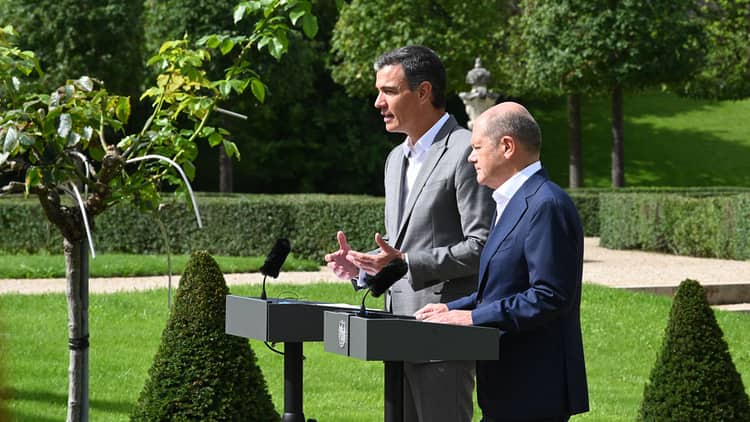The Diplomat
The President of the Spanish Government, Pedro Sánchez, and the German Chancellor, Olaf Scholz, yesterday confirmed the common front to advance the MidCat project, the gas pipeline to take gas from the peninsula to the heart of Europe, which Berlin publicly supported but which has the reticence of the French President, Emmanuel Macron, reports from Meseberg the special envoy of Europa Press, Víctor Juda.
In a joint statement after participating in a meeting of the German government’s Council of Ministers, Sánchez expressed his agreement with Scholz on energy issues. “I am very grateful for the German Chancellor’s shared vision of the need to speed up interconnections,” said the head of the Spanish government.
Sánchez regretted that the interconnection targets set by the European Commission for the peninsula and the rest of Europe are currently not being met, as they are below 3%. This means, according to the President of the Government, that Spain is not exploiting its regasification capacity to the full, 30% of the EU’s total, due to the “bottleneck” caused by the lack of connections with the centre of Europe.
Without expressly mentioning France’s refusal to increase connections through the Pyrenees, he pointed out that the alternative to MidCat is to work on the gas pipeline connecting Spain and Italy. “If (the interconnections) are not developed at the right pace, the European RepowerEU strategy also outlines another interconnection between the Iberian Peninsula and Italy”, Sánchez stressed.
In this way, the Spanish Socialist has set himself the goal of improving energy connections. “That is what we have to resolve, whether it is through France or Italy”, he added, affirming that Spain “will respond to the call” of the countries that suffer most from the “unacceptable blackmail” in energy matters by the Russian president, Vladimir Putin.
The MidCat project has been paralysed for years due to its high costs and the hitherto low price of Russian supplies. The 226 kilometres of pipeline from the Catalan town of Hostalric to the French town of Barbaira still need to be built, and Spain is asking the EU to cover the costs.
For his part, Scholz reiterated to Sánchez his support for a project like MidCat, pointing out that it will also serve to make the most of southern Europe’s potential in the field of green hydrogen. “This is the great task: the creation of a large European electricity network, a future for hydrogen and now for gas pipelines. We want to do everything we can to achieve this,” said the German Social Democrat. Scholz drew a comparison with other times of crisis in Europe, pointing out that improving connections between Europeans is something that contributes to giving “stability to societies and economies”.
Germany has seen the price of electricity soar, while the Russian company Gazprom has reduced supplies through the Nord Stream gas pipeline by 20%.
France is open to studying the proposal
France’s Minister of Economy and Finance, Bruno Le Maire, has indicated that the country will examine the request to unblock the development of MidCat: “It is a very old question […], but as soon as the Spanish Prime Minister and the German Chancellor, representatives of two countries that are friends of France, make this request, we will examine it“, Le Maire told the press after an event in Paris, in declarations reported by Radio Nacional.
Sánchez took part on Tuesday as a special guest at the German government’s conclave at Meseberg Castle, north of the German capital. The meeting focused on energy and security comes just a day after the President of the European Commission, Ursula von der Leyen, opened herself up to intervening in the electricity market and tackling its reform in order to deal with Russian energy “blackmail”.
The idea of setting a ceiling on gas prices, a measure that will be discussed by energy ministers on 9 September at the height of the electricity price boom, is gaining ground in Europe. This is something that Spain and Portugal are already doing thanks to the so-called ‘Iberian exception’, which could now be extended to other member states.
Moncloa believes that time is proving the leader of the Executive to be right, and the measure implemented two months ago by Madrid and Lisbon, with the permission of Brussels and the approval of the rest of the European partners, is gaining ground among the EU-27, which has enabled Spain to save 1,383 million euros, according to the Government’s calculations.







